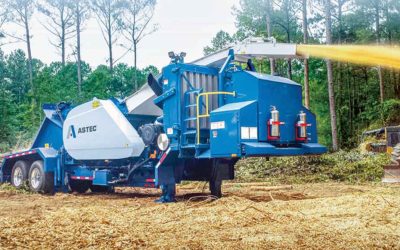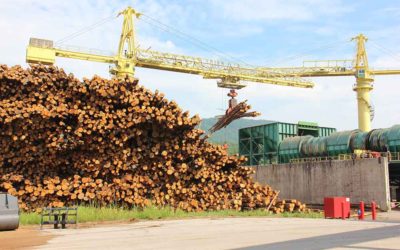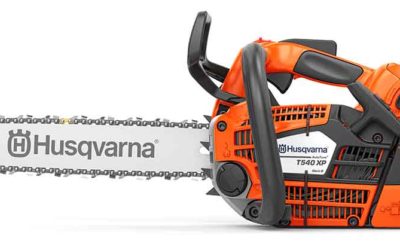Economic Impact Of Fighting Coronavirus Will Hit Loggers Hard—But For How Long?
Article by Dan Shell, Managing Editor, Timber Harvesting May/June 2020
 Feeling all “critical and essential” yet? After congratulating themselves for maybe half a day after being deemed such an important part of the economy as much of the larger economy shut down this spring, loggers and their representative associations have continued the hard work of surviving the coronavirus economy and its pitfalls and perils.
Feeling all “critical and essential” yet? After congratulating themselves for maybe half a day after being deemed such an important part of the economy as much of the larger economy shut down this spring, loggers and their representative associations have continued the hard work of surviving the coronavirus economy and its pitfalls and perils.
The logging industry has two priorities, in order: first, staying healthy while protecting employees and families; and second, surviving financially during the lean months ahead.
• Staying healthy must be priority number one, because if you’re sick you are definitely not working—no matter how essential you may be. Carolina Loggers Assn. Executive Director Ewell Smith emphasizes, “The priority is the safety of our loggers, period. Without the loggers, all of this shuts down. So we have got to keep the loggers healthy.”
Safety and health policies vary by state and even county, as do guidelines and requirements loggers must follow to continue operating. As an example, Associated Oregon Loggers sent a 4-page PDF to its members detailing requirements to continue operating under six state executive orders that were issued during a two-week period and cumulatively closed much of the state’s economy—while other states have been less heavy-handed and left it up to businesses to develop their own virus safety policies.
Loggers need to map out daily work routines and identify interactions and potential exposures, among employees on the job and others such as drivers who interact with more people during the day. Find ways to eliminate or greatly reduce potential exposures through wearing masks and or gloves and using sanitizer and wipes when and where needed—then hold employees to the policies just like wearing hardhats and other PPE gear.
Another impact is the rescheduling of hundreds of safety training and logger certification sessions across the country.
Associated Logging Contractors-Idaho Executive Director Shawn Keough noted in a recent mailing that sessions throughout the state are being rescheduled and some accreditations will be extended. One issue is logging companies that are seeking initial certification before being able to work might be looking at delays.
In addition to rescheduling work, Keough says she’s fielding calls and questions about what to do if an employee or family member tests positive for COVID-19 and sharing information from medical professionals.
• Financial impact to loggers can’t be overstated: It’s going to get worse before it gets better, and loggers need to be prepared for lean months ahead.
Impacts on construction activity are a bit uneven so far, with the West Coast having more major market construction shutdowns and slowdowns. However, with widespread unemployment and reduced economic activity, lumber and panel prices are headed downward and mills nationwide will be cutting back on hours and production.
Market dynamics and demographics are still in place for a strong recovery—when it happens (see news page 6). But turning and reopening such a large economy, getting 10+ million people back to work and putting industry in a strong demand position is going to take some time. Don’t hold your breath.
Associated Oregon Loggers Interim Executive Director Rex Storm says Oregon’s forest products sector is “reeling” after multiple mills closed or drastically reduced hours and began taking fewer logs and no gatewood.
“As goes curtailed mill production, so goes the log yard deliveries to the mill in a just-in-time marketplace,” Storm says, adding that with log prices dropping, many landowners don’t want to harvest now.
“It is not so much having a sick crew affected by the virus as it is the way the virus is affecting the market,” points out Arkansas Timber Producers Assn. Executive Director Larry Boccarossa.
“The loss of production affects equipment payments,” Boccarossa says. “The payroll protection legislation from the federal government is good, but it is going to be a question of being able to go to the bank or having some grace period with the equipment company.”
The Great Lakes Timber Producers Assn. (GLTPA) sent out a good advice piece from associate member Compeer Financial about finding time—now—to contact bankers, creditors, vendors and discuss the future and how to survive the virus’ economic impact.
Communicate with employees, suppliers, wood-consuming mills and creditors to determine the full impact on your business, then develop plans and seek agreements enabling your business to survive.
Henry Schienebeck, GLTPA Executive Director, says loggers in the region will see more impact as they move past the spring thaw slowdown, and many are already applying for small business assistance in anticipation of future cutbacks.
So far, building products mills are taking downtime, while pulp and paper markets are still good, Schinebeck says. “I never imagined myself stating this but the challenge will be finding timber sales where the majority of product is pulpwood.”
Virginia Loggers Assn. Executive Director Ron Jenkins says many Virginia loggers are looking into the paycheck protection program (PPP), tax relief programs and low interest small business loans. “SBA lenders are very specific,” Jenkins says. “Fortunately VLA has four bank members, of which three process SBA loans.”
In his five years in his position, he relates, “This is the single issue with the most inquiries and requests for help.”
Latest News
Astec, Bejac Announce Distribution Agreement
Astec has announced Bejac Corp., a heavy equipment dealer with 10 locations, will represent the Peterson line of forestry and environmental recycling equipment in California and Arizona. Bejac, founded in 1953 operated as an underground pipeline contracting business until 1985 when the company pivoted to the heavy, specialty equipment sector. In 2008, Bejac rapidly expanded its product line offerings and now focuses on a diversified customer base that complements Astec growth strategy…
J.M. Huber Corp. Receives Management Honor
J.M. Huber Corp. (Huber) has proudly announced it has been selected as a 2023 U.S. Best Managed Company Gold Standard honoree. Sponsored by Deloitte Private and The Wall Street Journal, the program recognizes outstanding U.S. private companies and the achievements of their management teams. The 2023 designees are U.S. private companies that have demonstrated excellence in strategic…
New From Husqvarna: T540 XP Mark III Saw
Remastered for reliability, the new T540 XP Mark III from Husqvarna responds to the need for greater power, productivity and maneuverability with products that get the job done safely, efficiently and effectively. The new T540 XP Mark III was redesigned following consumer feedback resulting in a lightweight, balanced, and agile chain saw for climbing and cutting. With a high cutting capacity, the T540 XP Mark III was redeveloped to ensure maximum reliability and trusted performance over hours of use…
WANT MORE CONTENT?
Spanning seven decades since its inception in 1952, Timber Harvesting highlights innovative and successful logging operations across the U.S. and around the world. Timber Harvesting also emphasizes new technology and provides the best marketing vehicle for the industry’s suppliers to reach the largest number of loggers in North America and beyond.
Call Us: 800.669.5613



